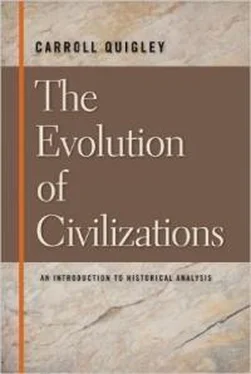For reasons that should be evident, the absolute point of view based on philosophic realism had considerable appeal to the conservatives and the defenders of oligarchy. It denied the possibility of real change and justified the existing social and economic inequalities as being based on real, eternal distinctions. Furthermore, by insisting on the reality of group differences it reduced the appeal of individualism and justified the domination of the group over the individual. Parallel reasons made the nominalist and relativist point of view appealing to the egalitarian, individualistic progressives. Nominalism, which recognized the existence of individuals, denied the real existence of groups and thus denied that economic and social inequalities were anything more than accidental and changeable features. This point of view justified individualism as the only reality, insisting that groups or universals were merely conventional collections of individuals to which a common name was given. Such a name was arbitrary and temporary, capable of change and even of complete reversal so that, for example, slavery could be called freedom and tyranny could be called justice, if men merely agreed on the convention to do so.
Thus the sophist Hippias, according to Plato, questioned the reality of the group (the state) by saying, "I believe all of you are kinsmen, friends, and fellow citizens, not by law but by nature; for by nature like is akin to like but law is the tyrant of mankind and often makes us do many things which are against nature." And again the sophist Lycophron questioned class distinctions with the statement, "The superiority of noble birth is imaginary, and its prerogatives are based merely upon a word." The real existence of a slavish nature in conventional slaves was challenged by thinkers like Al-cidamas who said, "God made all men free; no man is a slave by nature," and Euripides who wrote, "The name alone brings shame upon a slave, who can be excellent in every way and truly equal to the freeborn man." Another sophist, Antiphon, questioned the real distinction between Greek and non-Greek, saying, "As to our natural gifts, we are all equal, whether we be Greeks or barbarians." According to Plato, Thrasymachus, a sophist, upheld the conventional, arbitrary, and nominalist character of justice by saying that this was merely a word which we apply to whatever the strong impose on the weak.
The nominalist outlook of the sophists was congenial and acceptable to the Ionian scientists, to the democrats, and to most progressive and reforming persons. In many instances, such as Anaxagoras, these "popular" roles were combined in one person. In any case, they were closely allied. This alliance, for a generation (461-429 D.C.), was under the leadership and patronage of Pericles, in whose "kitchen cabinet" Anaxagoras was a prominent member.
4. Age of Conflict
The period of expansion continued until the middle of the third century B.C. in the western half of Classical antiquity, but ended two centuries earlier in the eastern half. We can fix these dates with a good deal of confidence, but the mechanism that caused the change is considerably clearer in one case than it is in the other. The dubious instance is the earlier one, in the mid-fifth century in the Greek-speaking world.
In this earlier case we can see quite clearly that there was a change from a period of expansion to a period of conflict. Before 450 B.C. the four usual kinds of expansion (in production, population, geographic extent, and knowledge) are evident, but after that date they are much less so. On the other hand, three of the four characteristics of an Age of Conflict (decreasing rate of economic expansion, increasing class conflicts, imperialist wars, irrationality) seem to be increasingly evident after 450 B.C. If we move further away from this demarcation date, to compare, for example, 500 B.C. with 400 B.C. or 550 B.C. with 350 B.C., it becomes even clearer that the culture has passed from expansion to conflict.
To be sure there are difficulties, but in some cases, at least, these can be explained away. We must remember that the point at which a civilization (or an area in a civilization) turns from Stage 3 to Stage 4 is the point at which the rate of expansion ceases to rise and begins to decline; it is not the much later point at which expansion itself ceases and is replaced by contraction. There is thus a considerable length of time between these two points during which expansion continues, but with a decreasing rate. In the case of a core area, such as Greece, the difficulty in determining the date is increased by the fact that the rate of expansion itself is still continuing to rise in more peripheral areas (such as the western Mediterranean), and the helpful influence of prosperity there can serve to conceal the less optimistic picture in the older area.
Other sources of ambiguity in demarking the two stages from each other arise from closely related conditions. The ending of geographic expansion and of the growth of knowledge is difficult to establish in the core of any civilization as long as that civilization is continuing to expand in its peripheral areas. In fact, the expression "geographic expansion" can apply only to the society as a whole and could never be established for some limited portion of it. On the other hand, it does seem likely, although the evidence is not available, that the growth of knowledge, for the ordinary Greek, ceased to increase in the fourth century. The wars, insecurity, and general confusion that became endemic in Greek life after 430 B.C. must have made it increasingly difficult for the ordinary Greek (that is, the one who lacked the leisure provided by slaveownership) to obtain information. The established methods by which information was diffused in Greek society, through conversation rather than by reading and thus through such periodic gatherings as the Olympic Games, the Panathenaic festival, and visits to the local agora, as well as the more irregular intercourse provided by visits from foreign celebrities or journeys to places like the Delphic oracle—all these weakened as methods of communication for the ordinary nonslaveowning Greek after 430 B.C. The possibility of becoming literate or of obtaining information from written works may also have decreased about this time, or a little later, for the nonslaveowner. On the other hand, these written sources of information may well have increased in availability for leisured slaveowners for a long time after the fifth century B.C.
If the cessation of the four aspects of an Age of Expansion is difficult to establish for Greece in the fifth century, the advent of at least three of the four aspects of an Age of Conflict is easy to demonstrate. There clearly was a decreasing rate of economic expansion, at least after 400 B.C., for the economic troubles of Greece in the fourth century and later are notorious. The growth of class conflicts seems equally evident. Of course, it might be argued that such class struggles were always present in Greece; and, within limits, that is true. Social tensions had reached a very high peak in the period of transition from gestation to full expansion but had then subsided only to rise again at the transition from expansion to conflict. In Athenian history where our historical evidence is more adequate than elsewhere, there can be no doubt that social tensions reached a high point in the period between Draco and Solon (say 600 B.C.) and then subsided to a low point about 500 B.C. (just before the Persian Wars) only to rise again about 400 B.C. Moreover, the kind of class conflict was different in the earlier period than it was in the later one. In the former the struggle was between the forces of dynamicism of the Age of Expansion and the efforts of the older dominant groups to prevent change and to maintain the static social conditions of the period of gestation. Draco and his supporters wished to maintain the noble-dominated, self-sufficient, largely pastoral economic units of the earlier period, and sought to resist the growth of such innovations as the expanding money economy, the growth of commerce, the development of city life, the rise of a middle class founded on commerce, the shift to a more democratic military force based on infantry from the older system based on the use of chariots by a hereditary nobility, and the resulting modifications of law and justice inevitable with increased social change. This kind of conflict was based on tensions of development in which older ways of providing for human needs resisted the innovation of new methods for providing for these needs. Such tension is endemic in any dynamic society, and, from it, social conflicts can arise at any time.
Читать дальше










